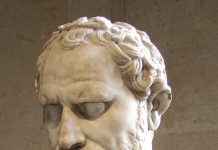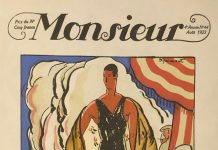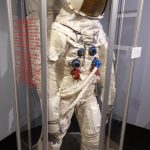In preparation for reviewing this book, the third in a trilogy, I read the first two books. A total of some 900 pages on Ray Bradbury, whom I met in Atlanta in 1998 at DragonCon. To give you my overall impression first, I rate this trilogy very highly, and it is certainly essential reading for any Bradbury fan.
When one writes a book and sends it off into the world, it is completely unknown how that might influence people in the future. Just today I saw an interview with the Youth Poet Laureate of the United States, who said she was inspired to write poetry by Bradbury’s 1957 novel Dandelion Wine.
That early phase of his career is covered in Vol. 1, while his mid-career is in Volume 2. This final book begins as the Apollo Moon program was winding down in the early 70s.
Together with Arthur C. Clarke, he was the public voice of “science fiction” during the Apollo 11 mission in 1969, even though he actually wrote few works that could be considered as science fiction. But with his Martian Chronicles as a bedrock to rest his reputation on, the exploration of Mars from the 1970s until his death in 2012 was closely linked with Bradbury as a seer of the future, not of Martian exploration per se, but rather the impact such exploration would have on the human psyche. As radio pioneer Norman Corwin said, “Mars was, to the best of man’s intents and purposes, captured by Ray Bradbury.” When the Viking probe landed on Mars in 1976, Bradbury was at mission control, the Jet Propulsion Laboratory. While there he said “We must move out to the stars. We are responsible to the gift of life in the universe…and space travel is a responsible way of reacting to the gift of life that we have.” He was a big cheerleader for the space agency in other ways too. “There was nobody like Ray Bradbury to force NASA to make really striking films,” said the famed oceanographer Jacques Cousteau, who I had also the good fortune to meet.
Since his name is so closely linked in the public imagination with science fiction, it will surprise many that he never actually thought of himself as a science fiction writer. Along with reading these 3 books, I have also been watching all 65 episodes of Ray Bradbury Theatre, which ran on TV from 1985-1992. As author Jonathan Eller states, the six seasons of shows (typically 25 minutes each) “reprised a broader range of his science fiction stories, as well as many of his fantasies, tales of suspense, and magical realism.” Having seen half the series so far, only one is real science fiction (a Martian story). In a brilliant analogy, Eller writes that most of his life in this era was “consumed by a half-dozen major projects centered on stage and screen adaptations. His attraction to success in these forms was no less mysterious to Bradbury than gravity itself had been to astronomers before Newton.” One such aborted project was a collaboration with the mime Marcel Marceau on a “stage play without words.” Eller had the good fortune to work with Bradbury on the first 2 books, so his perspective throughout is unparalleled. It’s almost like Bosworth with Dr Johnson.
Eller also had access to family members and other interviews, including one with James Day in 1974, in which Bradbury described his intuitive method of writing. “You must never think at the typewriter, you must feel. Your intellect is always buried in that feeling anyway. You do a lot of thinking while you are away from your typewriter, but at the typewriter you should be living, it should be a living experience.” That sense of living – of immediacy – is at the heart of Bradbury’s everlasting success. And through it all he maintained a “balancing act between high and popular culture” which often saw him take on the “intellectual establishment” and “enemies of exploration.” Eller writes that like the Italian filmmaker Fellini (the two men knew each other well), “Bradbury’s kind of creativity depended on originality and the need to write his own perceived truths without interference from critics or publishers.” That he was taken seriously in all this, despite his own lack of higher education credentials, is a measure of his iconic status. “He had found his own way as a unique and often masterful writer of short fiction by suppressing rational, judgmental thought, relying on an idea or a memory to create characters that would tell their own tales.”
To say that this and the other two volumes are insightful would be a drastic understatement. Bradbury has indeed been fortunate, in life and now in posterity, to have such a thoughtful and sensitive soul as Dr. Eller to write on his life. Ray Bradbury will be remembered forever, with this trilogy being as fine a capstone as one could wish to place on the monument to a life of everlasting worth.
Dr. Jonathan Eller is Professor of English at Indiana University-Purdue University in Indianapolis.
Ray Bradbury: Beyond Apollo is $34.95 by University of Illinois Press













